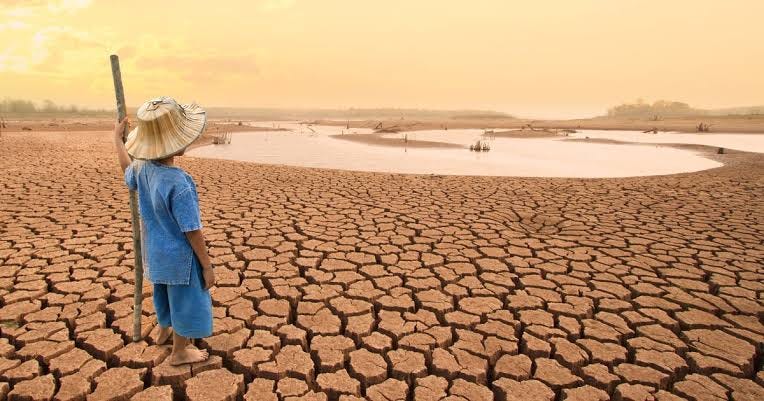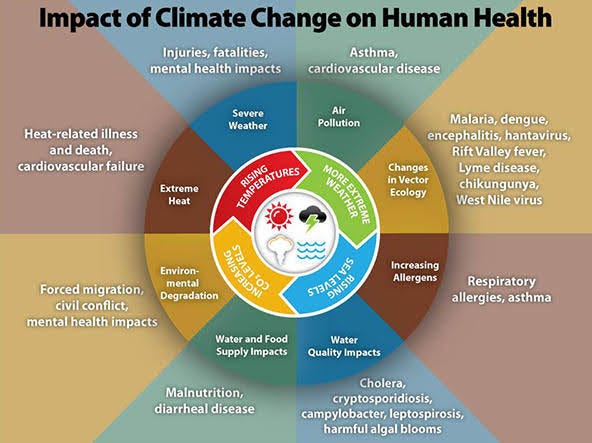How Climate Change Causes Allergies in Coastal Areas
Climate change impacts on people in coastal areas of Nigeria in many ways. Here is one pertaining to health, and it's important, especially as the allergy season begins.
At Yonren on the Nigerian Atlantic Coast in September, Igbekele Oladapo sneezes inside his shack, not far from the ocean. The ocean breeze brings in the scent of seeweed and fossil fuel and flared gas, and before long, it fills the shack, and in a response, Igbekele’s son, Dele, sneezes inside the shack. Igbekele’s wife carries Dele, sings to him, but just then, another breeze sweeps into the shack, infiltrating her nose, and as she bites her tongue with anger, she begins to sneeze like the rest.
In the waiting room of a Benin City hospital also in September, many patients sit on chairs, breathing heavily, asthma patients. Not long after, the door opens, another person enters the room, a man dressed in a black shirt and blue trousers, breathing heavily, another asthma patient. A slow music wafts into the air as a women and her son enter the hospital, holding themselves in anguish, the boy chewing on his tongue amidst the scent of disinfectant, another set of asthma patients.
Credit: Intechopen.com
In many parts of the coastal areas of Nigeria, the problem of asthma and other respiratory diseases persists. The number of sufferers escalates, those suffering from asthma. The number of people grow, people suffering from allergies such as sneezing and itching, as well as irritations to the skin and eyes. The number of people increase, those at the mercy of conjunctivitis, as well as complications from respiratory problems and the challenges from other illnesses.
According to a report, the prevalence of allergy airway diseases such as asthma and rhinitis has increased dramatically to epidemic proportions in Nigeria. Not just in Nigeria, but in Africa. Not just in Africa, but in developing nations. Another report said no fewer than 50 million Nigerians suffer from allergic reactions. No fewer than 50 million unfortunate men, unfortunate women, unfortunate children, suffer from allergic complications. No fewer than 50 million Nigerians suffer from asthma, sneezing, conjunctivitis combined, allergies from lots of dust and pollen grains and gases floating in the air.
Of course, genetic problems could be responsible. As many claim, sanitation problems could also be responsible, the fact that many people feel hesitant taking care of their surroundings. And then, physical problems could be responsible, through injury, carelessness, or other strange factors. But there is no doubt that climate change could also be responsible, due to the wind direction changes from Harmattan, due to pollution from the oil exploration process, due to the presence of pollen in the atmosphere, due to the deterioration of air quality.
Credit: BBC.com
For example, the increased concentration of carbon dioxide leads to rising air pollution. The increased concentration of methane, another of the greenhouse gases, leads to rising air pollution. The increased rate of soot, a product coming from the burning and mixing and turning of stolen crude oil in illegal refineries in the Niger Delta, causes rising air pollution. These negative changes in the air quality, according to experts, not only warm this part of the world, but also cause severe and prolonged heatwaves, variability in temperature, forest fires, droughts, and flooding, with the resulting inferior air quality leading to respiratory diseases such as asthma.
Credit: Armadale Family Clinic
In addition, climate change influences pollen production. Climate change influences the production of mold, warm air containing much more moisture than cold. Climate change influences dust production, through the heat prevailing in the atmosphere, through the dryness of the earth surface, through the particles of sand in the air. In other words, climate change through mold and dust production helps induce allergic manifestations in places like the coastal areas of Nigeria, where many already suffer from respiratory problems, intensified by pollen production. Obviously, repercussions arrive from respiratory challenges. Even though statistics are scarce about exact figures, repercussions come on a daily basis about the respiratory challenges. Repercussions, sore and sure and sharp repercussions, arrive from the increased temperature and deterioration of the air quality in the coastal areas of Nigeria and other parts of the world.
Credit: The Guardian
One repercussion concerns the socio-economic burden of allergy. It brings a financial drain. It brings mental-health problems, since it needs expensive short-term treatments. It causes physical challenges, because it takes place over a long period of time, as the health of the sufferer becomes challenged for several decades in some cases. It causes pains and discomfort, and when physical and mental health and psychological challenges involve enormous commitments, it becomes not surprising that they result in lots of financial drain.
Financial drain also comes from children becoming allergic to the effects of the greenhouse gases floating around us. They find it difficult with learning. They find it difficult with reading, as the bouts of sneezing could be embarrassing and painful. They find it problematic with schooling generally, since coughing and sneezing and conjunctivitis that result from the various allergies make them so uncomfortable in school that the result is a difficulty with learning.
Credit: Adobe Stock
Adults may underperform. When the challenges from allergies become too enormous, patients lose days by not working. When the problems prove insurmountable, especially when treatment is unavailable, the state loses man hours through its ill workforce. When the people cannot take care of themselves, the nation loses the productive strength of its female workers, its male workers, its auxiliary workers. When the increased temperature, intense heatwaves, extreme rainfalls, and floods complicate the allergies of people, and when lack of treatment at hospitals further worsens the situation, it becomes understandable that adults with allergies may underperform.
Though Nigeria lacks exact figures about people under the impact of allergies, the World Allergy Organization (WAO) locates the enormity of the issue in its graphic forms. According to WAO, the allergy leads to an increased frequency of cardio-respiratory events. It results in the rise of respiratory diseases, because of the intensity of ground-zero ozone and other factors. It impacts not only on the morbidity, but also on the mortality of people with respiratory diseases, making them ultimate victims of prolonged heatwaves and other issues associated with climate change, putting people living in the coastal areas of Nigeria under risk.
Credit: The Cable
In sum, climate change represents a threat to the people going forwards. It represents a threat, because climate change might result eventually to migration of people in the near future. It represents a threat when the people involved with migration get to new areas, and face increased potentials for developing allergies through movements to areas with an intense prevalence of allergies. It represents a threat because with the rising sea levels and high temperature, people might seek for safe areas, and it’s when they face increased exposure to new realities they’ll realize the exact dimension of the threat.
“Our planet is losing its capacity to sustain human life in good health,” said the former Director of the World Health Organization (WHO), Dr. Margaret Chan.
If current emission rates persist, mean temperatures will rise by 4.8 degrees centigrade from 1990 to 2100. If the burning of fossil fuel continues at the present rate, with carbon dioxide and black carbon emissions remaining uncontrolled, the projected 4.8 degree centigrade rise in annual temperatures could prove disastrous. If climate change increases heatwaves, drought, and flooding around the coastal areas in Nigeria and around the world, making a 4.8 degree centigrade annual temperature rise the reality, the incidence of allergies would increase in the population, resulting to complications on the health front of Nigeria and other places, making the planet lose even more of its capacity to sustain human life in good health.
"Nigeria also needs to intensify activities in the area of adaptation and awareness creation to ensure the implementation of the UNFCCC policies,” said Dr. Rui Gama Vaz, former WHO’s representative in Nigeria. “This will empower the government to protect health from climate change.”
The awareness creation must involve impacts of climate change on public health. Not only that, it should involve impact of the scourge on public education, to enlighten teachers, pupils, and other stakeholders on the link between climate change and allergies. It should include the connection between climate change and preventive options, so the risk of developing allergies from climate change could be minimized, lessening the financial cost of treatment. With awareness creation in the area of public education and preventive options and other key areas, the people in the coastal areas of Nigeria can adapt to climate change and prevent the breakdown of public health.
Apart from awareness creation, improving disease surveillance could prove an effective protection against the risk of developing allergies. It could allow for a credible adaptation measure against not only allergies, but also a protective cover for other diseases such as malaria and dengue in a climate filled with greenhouse gases. In a warm climate rife with possibilities for allergic diseases and illnesses such as malaria and dengue, the coastal areas of Nigeria, indeed coastal areas around the world, need to ensure disease surveillance.
Unfortunately, Nigeria makes just a little contribution to global greenhouse gas emissions, with the West culpable for much of the problem. The West contributes over 90 percent to greenhouse gas emissions. The West contributes most to global warming, with Africa contributing just 3.8 percent to it. The West contributes most to the declining air quality, leaving African countries to become victims to climate change, possibly becoming the hotspots of vulnerability to the adverse impacts of climate change in the coming decades. The West therefore should take over some of the responsibility of coping with increased warming and rising greenhouse emissions and declining air quality in places like the coastal areas of Nigeria, because the fact that Africa warms faster than the global average means people responsible for the condition must also be responsible for adaptive measures over the greenhouse gases.











